Speak Your Mind
Two Lost Souls in a Dirty Night (Dois Perdidos Numa Noite Suja, 2002)
"I Come From a Land Down Under" -- Marcia Nascimento talks to HO about co-producing Jose Joffily's Brazilian feature "Two Lost Souls in a Dirty Night"
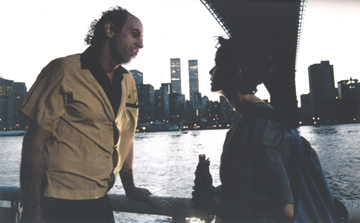
"They had nothing in common -- only the desire of living the American dream. And they went through hell to make this dream come true."
It was a cold, windy day in January as we sat in Astoria's Bohemian Bar and discussed "Two Lost Souls in a Dirty Night," a film based on Plinio Marcos' 1966 play about a gay couple living on the fringe of Brazil's sprawling Sao Paulo. In filmmaker Jose Joffily's version, Paco is transformed into a young woman and the story was transplanted into Brooklyn, New York, to make it more current with issues affecting the Brazilian community. In the press kit for "Two Lost Souls," Jose Joffily explains, "To try to recover the impact of the original play, we had to be different in order to be similar, we betrayed to be equal, and we adapted to be able to be the same."

Marcia Nascimento, who co-produced the Brazilian feature "Two Lost Souls in a Dirty Night," sat across the table from me as I fumbled with the tape recorder. She is a relative new-comer to the film business, having spent over 18 years in investment banking but she has that innate love of life that seems to be the core of Brazilians (except for that dour woman played by Fernanda Montenegro in "Central Station"). Any apprehension I may have had about discussing a movie with a producer was dispelled by her easy going manner. Marcia has a sunny disposition and is quick to laugh. Her sense of fun is a two way street, though. She continually knocked me off balance with her wonderfully off-beat sense of humor. Except for some technical glitches with the tape recorder, everything went fine as we discussed the film over some hot chicken noodle soup. We sat at a table near the window, sharing our space with the Bohemian's drowsy cat, or was the cat graciously sharing its space with us? It all depends on point of view.
Waitress: Are you okay with the cat?
Marcia: It's a beautiful cat.
HO: So, we were talking earlier, actually, while the batteries in my tape recorder were dying, about your involvement as one of the producers on "Two Lost Souls in a Dirty Night." The original budget was in Brazilian Reals and after the attacks on 9/11 the Real devalued against the dollar which effectively took half the production budget away. That led to your involvement
Marcia: sort of, financially speaking, but I was involved at the very beginning of production because the wardrobe person, Ellen Milet, she had to come here to buy clothing for the characters, for the actors. She needed a guide. We walked around in thrift shops in Brooklyn, then we went to the Salvation Army to get clothes that were raggedy and used. We were supposed to have that kind of look. Then we had to ship the clothes to Brazil for those scenes being shot there in place of New York. Well, we dress totally different in Brazil than you do here. We needed to have that New York look.
HO: In Brazil the style is more like thongs?
Marcia: It's horrible. If you want to go down there for philanthropic reasons, you could go and buy clothing for all those poor, little, beautiful girls that walk down the street almost naked.
HO: Did I tell you that this is only the first part of the interview? The rest we're going to have to do in Brazil. Where in Brazil was "Two Lost Souls in a Dirty Night" shot?
Marcia: Rio de Janeiro.
HO: So the garage-set, where the characters lived, that was in Rio?
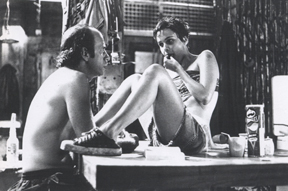
Marcia: Yes, a warehouse. That was the stand-in for a garage in Brooklyn. The art director, Cludio Amaral Peixoto, came to New York, looked around, and took pictures to take back to Rio. I think he did a wonderful job.
HO: The movie takes place solely in the U.S. but is shot in both countries. The characters are people who have immigrated to the United States and they think they will become rich here.
Marcia: I don't think this is just a Brazilian thing. It's a fantasy that many people have that everything in the United States is perfect.
HO: There was also a scene in a prison.
Marcia: That was shot in Brazil at an actual prison. The interior and exterior of the prison was filmed in Brazil.
HO: Was it difficult to get permission to shoot at the prison?
Marcia: Things in Brazil can be very difficult or very easy, it all depends. It's all about charisma, who you talk to. You have to have a friend with connections. I guess it's like that all over the world. You have to talk to the right person to get the permission and you have to convince them to help you.
HO: You must have signed some documents.
Marcia: Yes, of course. The actual problem we had was that the script had to be rewritten after 9/11. Some of the scenes we shot in Brooklyn were before the attack. We had to think about, should we show The Twin Towers or not?
HO: That's why there was the scene where the character, Tonho, is at the newsstand looking at 9/11 buttons and junk.
Marcia: Exactly, to establish before and after the attacks in the movie timeline. There was a discussion of whether or not to keep the scene that we shot that had The Towers in the background. How is this going to affect the viewers emotionally? We came to the conclusion of let's keep it. Although, there was talk that new films after 9/11 shouldn't show the World Trade Center. There were rumors that they would not allow that to be shown. Our original plan was to go back to the World Trade Center and shoot there in the winter. That was supposed to be the characters' neighborhood, basically. It's where they would wind up.
HO: So, The Towers were like characters in the film.
Marcia: Yeah, exactly. We are from Brazil and we are shooting in New York, we are going to want to show The Statue of Liberty and The Twin Towers. This is a foreign movie. We want to have the recognizable locations of New York. What makes New York, New York. Obviously, after 9/11, we had to change that.
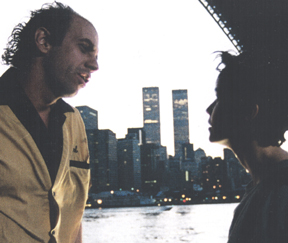
HO: What was the rap song over the opening credits?
Marcia: It was a song done for the movie by a Brazilian songwriter, Arnaldo Antunes, and David Tygel, who was the music director. All the music was made by these two talented guys for the movie, same thing for the songs that Paco raps in Central Park and the strip club.
HO: I noticed you were in the crowd that was listening to Paco in the Central Park scene.
Marcia: This is the first time I was in front of the camera, and to be honest, I didn't know I was going to be in front of the camera.
HO: You were very natural.
Marcia: That's because I didn't expect it. As far as I was concerned, I was just standing there watching the shoot.
HO: But you were standing next to one of the main characters!
Marcia: Yes, I was talking to Roberto (Tonho) but the camera was supposed to be on Deborah (Paco) rapping. I was talking to him, and the director of photography, Nonato Estrela, was making a joke by giving me this close up. I had no idea. Luckily I was wearing black because the camera puts on like 10 pounds. It is a concern!
HO: Good for Nonato. So, we have these two Brazilian characters living together in New York: Paco and Tonho.
Marcia: It's a twisted, psychotic, crazy love story, but it's definitely a love story.
HO: I think it's obvious that Tonho loves Paco, but do you think that Paco loves Tonho?
Marcia: Paco definitely loves Tonho. Realize that when Tonho leaves, Paco gets really sad, crying, and depressed.
HO: She even asked Tonho why he didn't say anything earlier if he was in love with her, bringing up the possibility that something might have happened if Tonho only had the courage to say it sooner.
Marcia: Paco loves Tonho, but Tonho is more sensitive and expressive. He lets it out before she does.
HO: Again another male/female role reversal that questions gender identity. "Two Lost Souls" is based on a forty year-old Brazilian play of the same name. What's the major difference or change between the play and the movie?
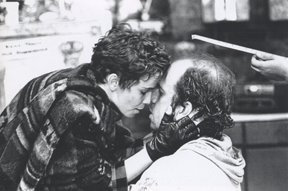
Marcia: Well, the major change was that the director, Jose Joffily, made the character Paco into a girl. Originally, it was a homosexual couple. He wanted to be loyal to the original story but he didn't want to copy the play into a theatrical movie.
HO: Well, changing Paco into a woman who assumes the identity of a boy works very well visually. This brings up the question of exactly what do people fall in love with when they are with someone. Is Tonho in love with Paco as a boy-prostitute or as a woman? It's not exactly clear and it helps make the story more interesting and complicated.
Marcia: What I think is that Tonho is in love with Paco as a boy. I think the homosexuality is implicit in there, but it's there.
HO: Is homosexuality socially acceptable in Brazil?
Marcia: Not very much. It is very behind the scenes. Jose Joffily wanted the issue to be more subtle but it is still there.
HO: I think it makes you consider sexual identity more than if it was simply two gay men. Another interesting thing is that Paco can have sex with gay men when she is pretending to be a boy but doesn't even want to touch a man as herself, as a woman.
Marcia: I think it has to do with the fact that she was abused as a child. When Tonho touches her she says, "Who gave you the right to touch me. You're not my husband. You're not my boyfriend. You're not my father!" So, obviously, she was abused. That's why she rejects men in that way. She's very conflicted.
HO: Tonho forces Paco to strip and call herself by her feminine name, Rita. It's only after she has done this that he can leave her.
Marcia: He can't leave Paco until she assumes her feminine identity of Rita.
HO: And I noticed in that scene that Rita has a Brazilian wax.
Marcia: Nothing gets by you.
HO: Well, films are a visual medium.
Marcia: I am surprised, you seem like such a low-key guy.
HO: Oh, you have no idea what goes on inside my head. Anyway, the actors Roberto Bomtempo and Debora Falabella were both excellent as Tonho and Paco, neither is new to the business.
Marcia: Especially Bomtempo. Bomtempo is like the veteran. He is well known in Brazil. He was in "Who Killed Pixote?" He's a very experienced guy. He's done T.V., theater, and film for at least 20 years. Debora is theater trained and she's done some T.V. before she was in this movie.
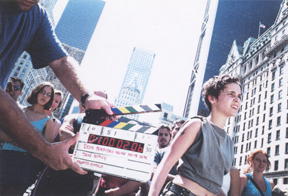
HO: She rapped in this movie. Has she ever rapped before?
Marcia: No, she never rapped before but she loved it. She never spoke English before, either.
HO: That's amazing. Her English was very good. Did she lose weight to play Paco?
Marcia: She's actually like that. She's a skinny girl. She's been doing soap operas and after "Two Lost Souls" she got this huge role in this soap opera called "The Clone." It's a big show on Telemundo.
HO: It's a soap opera about a clone?
Marcia: Yeah, it's about a clone and the Islamic community in Brazil.
HO: I didn't see that Islamic connection coming. Have you ever watched "The Clone"?

Marcia: Yes, I enjoy seeing how the actors shift from film to T.V. to theater. Debora Falabella is very good at all those. She just won best actress at the Brasilia Film Festival but she's very well versed in television, too. Now, she is playing a drug addict who comes from a very rich family in Rio de Janeiro in "The Clone."
HO: This brings us back to "Two Lost Souls," because it's also a class-thing between the main characters. Paco ridicules Tonho as being a hayseed while she has grown up with a silver spoon in her mouth.
Marcia: Yeah, there's a class difference, but Paco is a drug addict, she's a crack-head. She thinks she has it all. The drugs make her think she has all that power. She's a girl from Sao Paulo which is a big city, so she is supposed to be street smart, and learn fast. Tonho is supposed to be the guy from the interior. He's not as exposed to the world.
HO: An American equivalent would be someone who grows up on the streets of New York as opposed to a farm kid from Kansas.
Marcia: Exactly. I am very happy because Jose Joffily won for the first time at Brasilia Fest. He's won a whole bunch of other awards but this is the first time he's won Best Director. Paulo Halm won for Best Screenplay, too. "Two Lost Souls" is being shown at a number of Brazilian festivals; Gramado; the Rio Fest; the Brasilia Fest. The biggest one is Brasilia Fest. We have been shown in London, then in France, and here in the States at Palm Springs. Right now, we are looking for theatrical distribution.
HO: Jose Joffily, he's been working for a while, too.
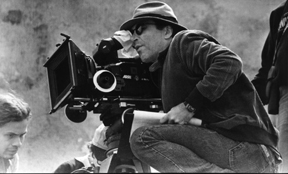
Marcia: He's very well known in Brazil. He's done a lot. He started out as a director of photography. A film Joffily directed that was much appreciated and that I like very much is "Who Killed Pixote?" "Pixote" was originally a movie by another director named Hector Babenco. It's an actual story of this kid who came out of the favelas. How do you say favelas in English?
HO: Slums?
Marcia: Yes, he came out of the favelas to play a street boy in a movie called "Pixote," so the boy actually played himself in the movie. He's a street boy who robs, goes to jail.
HO: He was cast because he was really living that life.
Marcia: What happened after that was that this boy went into television. He starred in a couple of soap operas. After the soap operas, he went back to the favelas and he got killed. So the question is: who killed him? Nobody ever talked about who killed this boy. The press said he was either killed by his gangster friends or his rivals. There is a controversial story that says that the police killed him. Jose Joffily directed the movie, wrote the script about who killed Pixote. In the movie, he literally accused the police.
HO: That's a big issue in Brazil. There's a lot of crime and the police will sometimes kill people rather than bring them in for justice.
Marcia: Well, they know too much. They've been in and out of jail for too long. They know too much about police brutality and police violence so at a certain point the police just execute them.
HO: I've heard the same about street kids, that the police will kill them to keep their numbers down.
Marcia: Yes that is my favorite movie that Jose Joffily did, "Who Killed Pixote?" Jose has courage and he dares to accuse the police.
HO: What's his style of directing?
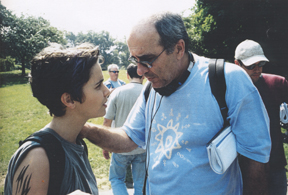
Marcia: He's a very cool guy. He has the power of making people do exactly what he wants without having to scream and yell. He never loses his temper. He has a talent to meet actors halfway. He allows the actors to improvise. Working with him has been a real learning experience. He's great to work with.
HO: That's an art in itself. You have to shoot things in a way that allows that style.
Marcia: The cinematographer was Nonato Estrela, he's very experienced, too. He's one of the best D.P.'s in Brazil.
HO: "Two Lost Souls" was shot very well. It reminds me a bit of a Wong Kar Wai or a Godard film, a deceptively loose style that allows that type of acting. If it isn't done just right, you have a big mess. It's easy to make the mistake of thinking that all you have to do is let the camera roll.
Marcia: I think he knows how to use the colors of New York, too, the gray and the blue of New York. I think he was very sharp to get Rio to match New York. I have to say that the Brazilian film industry is getting organized. It's getting much better. It's more aware, technically, it's coming up. On one page of Variety Magazine I saw four Brazilian movies. Just a few years ago, you wouldn't see a Brazilian film being reviewed by an American magazine. Brazilian movies are in a good place right now. I'm happy to have made my transition at this time. I came from Wall Street. I spent 18 years working in investment and I think I've made this change at just the right time. I can use all the experience I have in finance and turn this into a creative thing in my life.
HO: Do you want to direct?
Marcia: I've thought about it but I'm not there yet. I write short stories but I haven't published anything. I have the inclination, yes. I am a creative person, I would like to express that.
HO: You have! You are a mother of two sons!
Marcia: Yeah (laughing).
HO: That's a creative aspect as well. You've actually made people.
Marcia: Well, I would like to take some of that creative energy and make images, too.
HO: Oh no, we've gone through all my questions.
Marcia: Wow, was it as good for me as it was for you?
HO: I don't know, only you can answer that question.
Marcia: Well, was it good for you?
HO: Yeah.
Marcia: I got you to say yes!
HO: I like to agree with the ladies. Anyway, it seems like it was good for the cat. He's asleep but his ears keep moving like he's listening to us.

Marcia: A good sign.
---------------------
You can contact producer Marcia Nascimento about Two Lost Souls in a Dirty Night at:
Marcnasc@aol.com
Tom Graney -- copyright Hollywood Outsider 2002